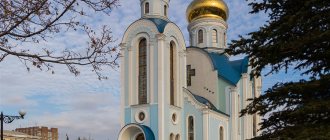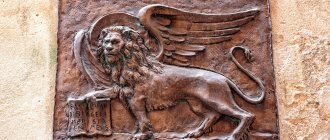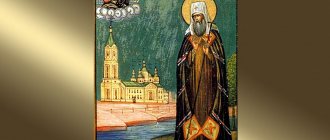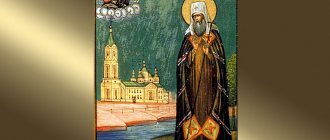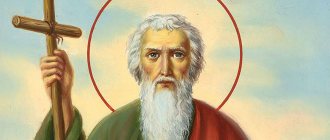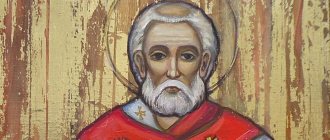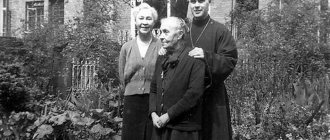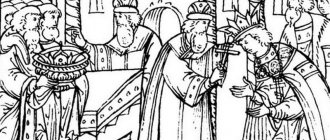The future metropolitan was born into an Orthodox family
Sergei Anatolyevich Golovkov was born on March 31, 1964 in Perm. The family was church-going: the father, Anatoly Grigorievich Golovkov, studied at the Saratov Theological Seminary, then sang in the church choir. Mother, Anna Vasilievna, also sang in church and helped churches. The family had an extensive library of spiritual literature.
In a real Orthodox family there are many children. Sergei had two brothers and three sisters. All of their parents raised them in the Christian tradition, so it is not surprising that they decided to connect their lives with the church.
Sergei's elder brother, Archimandrite Luke, heads the Icon Painting School at the Moscow Theological Academy
Sergei decided to devote his life to God while still at school
Seryozha studied well at school and could go to study anywhere. All roads were open for the boy. But Christian upbringing bore fruit - Sergei realized that his calling was to serve God and people.
After the army, in 1984, Sergei entered the Moscow Theological Seminary. Studying left him with the warmest memories.
In Soviet times, one could enter the seminary only after military service.
The Moscow Theological Academy became the alma mater for the future metropolitan
After graduating from the seminary in 1988, Sergei entered the Moscow Theological Academy. In 1990, the talented student became an assistant to the head of the Church and Archaeological Office at the academy.
1990
this year Sergei Golovkov took monastic vows under the name Mark
On October 19, 1990, another stage was passed in the history of the formation of the future metropolitan: in the Trinity-Sergius Lavra, a student of the Moscow Theological Academy Sergei Anatolyevich Golovkov was tonsured into monasticism under the name Mark.
On November 21, he was ordained to the rank of hierodeacon, and on January 7, 1991, to the rank of hieromonk. At the same time, Mark is working on his Ph.D. dissertation and teaching Holy Scripture at the seminary.
After graduating from the Moscow Theological Academy, Mark was sent to Jerusalem
The Russian spiritual mission in Jerusalem became an important milestone in the development of Mark as a priest.
In 1992, Mark graduated from the Moscow Theological Academy and defended his thesis on the topic “Blessed Diadochos of Photikie and his theological and ascetic views.”
The talented graduate was immediately found a suitable place where he could show himself. In August 1992 he goes to Jerusalem. The young hieromonk became a member of the Russian Spiritual Mission in Jerusalem. In the Holy Land, Mark gained invaluable experience of communicating with various Christian churches and plunged into an atmosphere of true holiness.
After 5 years of service, in 1997, Mark was elevated to the rank of abbot by Patriarch Alexy II himself. The experience gained while serving in Jerusalem allowed him to rise one step higher: in 1999, Mark was appointed deputy chairman of the Department for External Church Relations of the Moscow Patriarchate.
Department of External Church Relations - “Ministry of Foreign Affairs” of the Russian Orthodox Church.
In the person of Mark, the Church of the Life-Giving Trinity in Khoroshevo found its rector
On January 26, 2000, Mark became rector of the Church of the Life-Giving Trinity in Khoroshevo, and in May he became an archimandrite.
Hard work and activity continued to serve Mark. He moved up the stairs higher and higher.
In 2004, the Synod restored the Yegoryevsk Vicariate. Mark received the honorary rank of suffragan bishop.
A vicariate is an ecclesiastical administrative-territorial unit that is part of a diocese.
The bishop continued to deal with the external affairs of the church
The rich experience of interfaith communication and work abroad determined the main direction of Mark’s activity. He continued to be involved in church issues abroad.
On February 12, 2009, Mark became chairman from deputy chairman of the Department for External Church Relations. But he did not hold this post for long - already in March, Patriarch Kirill brought Mark even closer to himself: he became the head of the secretariat of the Moscow Patriarchate for foreign institutions.
But there was no need to idle at the post of “high boss”; Mark was thrown to the distant frontiers. He became the temporary administrator of the Hungarian and Vienna and Austrian dioceses.
The Chair of the Hungarian Bishop is located in the Assumption Cathedral in Budapest
In addition to external relations, Mark was also involved in administrative work. He took part in the preparation of the Sixth Local Council of the Russian Orthodox Church, which took place on January 27, 2009.
In 2011, a significant event took place for the Russian Orthodox Church. Patriarch Kirill, based on tradition, created the Supreme Church Council - the main executive body of the Russian Orthodox Church.
The first Supreme Church Council was convened in 1917 to govern the church during a time of chaos.
The heads of the synodal institutions of the Russian Orthodox Church became members. Therefore, the young head of the Office for Foreign Institutions of the Moscow Patriarchate, Bishop Mark of Yegoryevsk, also appeared on the council.
essays
articles
- Article by Archbishop Mark (Golovkov) “On modern innovations in the names of churches and monasteries” // pravoslavie.ru. - 2005. - October 7. — Date of access: 11/30/2017.
- Church protocol. M.: Publishing Council of the Russian Orthodox Church, 2007. 184 p.
interview
- Archbishop Mark of Yegoryevsk: “We are just learning unity in the Church” // Patriarchy.ru. - 2010. - September 22. — Date of access: 11/30/2017.
- Archbishop Mark of Yegoryevsk about the construction of the first Russian Orthodox church in Madrid // Patriarchy.ru. — 2011. — December 27. — Date of access: 11/30/2017.
- Archbishop Mark of Yegoryevsk: “If a priest talks about spirituality that is not supported by his own life, this is pharisaism” // Patriarchy.ru. — 2012. — March 13. — Date of access: 11/30/2017.
- Archbishop Mark of Yegoryevsk: People of different nationalities pray together in Orthodox churches in Thailand // Patriarchia.ru. — 2012. — March 16. — Date of access: 11/30/2017.
- Interview of Archbishop Mark of Yegoryevsk to the newspaper “Krestovsky Bridge” // Patriarchy.ru. — 2012. — February 15. — Date of access: 11/30/2017.
- Archbishop Mark of Yegoryevsk: “I have been in the Church since childhood” // Patriarchia.ru. — 2012. — October 26. — Date of access: 11/30/2017.
- Not only the mayor of Paris is not satisfied with the project of the Russian temple // Orthodoxy and the World. — 2012. — December 27. — Date of access: 11/30/2017.
- Archbishop Mark of Yegoryevsk: “The creation of the Church of St. Ludmila of Bohemia in Prague is a unique event of its kind” // Patriarchy.ru. — 2013. — January 9. — Date of access: 11/30/2017.
- Archbishop Mark of Yegoryevsk: For a full life of body and soul, a church is needed // Patriarchia.ru. — 2013. — October 11. — Date of access: 11/30/2017.
- There must be moderation in everything. Conversation with Archbishop Mark of Yegoryevsk // Patriarchia.ru. — 2013. — December 24. — Date of access: 11/30/2017.
- When we talk about church websites, we need strict simplicity in everything. Conversation with Archbishop Mark of Yegoryevsk // Patriarchia.ru. — 2013. — December 28. — Date of access: 11/30/2017.
- Archbishop Mark of Yegoryevsk: Money is needed to build a church in Strasbourg. // Patriarchia.ru. — 2015. — October 2. — Date of access: 11/30/2017.
- God help you. // mediaryazan.ru. — 2016. — January 07. — Date of access: 11/30/2017.
- Bishop Mark's greatest joy. // "Blagovest". — 2016. — November 1. — Date of access: 11/30/2017.
In 2014, the archbishop mastered a new area of activity
Smart and active people are needed in any organization. In 2014, the Holy Synod made an unexpected decision: the head of the Office for Foreign Institutions of the Moscow Patriarchate simultaneously became the chairman of the financial and economic management of the Moscow Patriarchate. The archbishop plunged headlong into a new field of activity.
Financial and economic management is the “Ministry of Finance” of the Russian Orthodox Church.
On November 4, 2015, in the Patriarchal Assumption Cathedral of the Moscow Kremlin, His Holiness Patriarch Kirill elevated Mark to the rank of metropolitan. Mark became the head of the Ryazan and Mikhailovsky Metropolis, formed in 2011.
Mark inherited a region with a rich and complex history. The burden of resolving numerous issues that have accumulated in the region fell on the shoulders of the new metropolitan.
awards
- Order of St. Sergius of Radonezh, II degree (“In consideration of the diligent archpastoral service and in connection with the fortieth anniversary of his birth”; April 12, 2004[25])
- Order of St. Seraphim of Sarov, II degree (June 6, 2006)[26]
- Order of Friendship (Russia) (July 20, 2011) - for great contribution to the development of spiritual culture and strengthening friendship between peoples
[27] - Certificate of Honor from the President of the Russian Federation (April 11, 2014) - for achievements in labor, significant contribution to the socio-economic development of the Russian Federation, services in the humanitarian sphere, strengthening of law and order, active legislative and social activities, many years of conscientious work
[28] - Order of the Holy Blessed Prince Daniel of Moscow, II degree (March 30, 2014)[29][30]
- Order of the Holy Sepulcher of the Jerusalem Orthodox Church
The Metropolitan promised not to close the territory of the Ryazan Kremlin to tourists
On November 30, 2010, the law “On the transfer of state or municipal property to religious organizations” was adopted. The church began to give away buildings that had once been (and in some places had never been) in its possession.
The Ryazan Kremlin is the pearl of the Ryazan land
The Ryazan Architectural Museum Reserve was founded back in 1884. The architectural complex includes unique buildings of both church and civil architecture. Museum exhibitions are located in the Kremlin buildings.
In the Singing Building, a building of civil architecture of the 17th century, there is an exhibition “According to Grandfather’s Custom,” which tells about the everyday life and holidays of the Russian people. The building's 17th-century interior has been restored, allowing you to immerse yourself deeply in the era
Until 2003, the museum lived in peace with the church. Services were conducted in the churches, the clergy and workers and visitors of the museum did not interfere with each other at all.
Everything changed in 2003. Pavel (Ponomarev) became Archbishop of Ryazan and Kasimov. With his arrival, an incomprehensible attack of the church on the museum buildings began.
Archbishop Pavel of Ryazan and Kasimov ruined the relationship between the Ryazan public and the church. He turned the unremarkable situation with the Ryazan Kremlin into an acute problem, laying claim to the entire architectural ensemble
In 2008, the church buildings were transferred to the church. Problems immediately began to emerge. The Ryazan Museum was federal, and museum staff closely monitored its safety. The church stopped reconstructing the buildings that were given to it.
The Church does not even monitor the temples. Restoration is not being carried out, although money is allocated for it. The future of the Ryazan Kremlin after the complete transfer of its church appears in a gloomy light
In 2015, the Ministry of Culture of the Russian Federation decided to evict the museum from the Kremlin. Public arguments that civil buildings are not covered by the restitution law were not heard. Now the dialogue between the church and society will depend only on the position of the Ryazan Metropolitan.
In a conversation with the governor of the Ryazan region in March 2022, Metropolitan Mark stated that the Kremlin territory will remain open to visitors. Whether the Metropolitan will keep his promise, time will tell.
Excerpt characterizing Mark (Golovkov)
All the household, as if paying for the fact that they had not taken up this task earlier, busily began the new task of housing the wounded. The wounded crawled out of their rooms and surrounded the carts with joyful, pale faces. Rumors also spread in the neighboring houses that there were carts, and the wounded from other houses began to come to the Rostovs’ yard. Many of the wounded asked not to take off their things and only put them on top. But once the business of dumping things had begun, it could not stop. It didn't matter whether to leave everything or half. In the yard lay untidy chests with dishes, bronze, paintings, mirrors, which they had so carefully packed last night, and they kept looking for and finding an opportunity to put this and that and give away more and more carts. “You can still take four,” said the manager, “I’m giving away my cart, otherwise where will they go?” “Give me my dressing room,” said the countess. - Dunyasha will get into the carriage with me. They also gave away a dressing cart and sent it to pick up the wounded two houses away. All the household and servants were cheerfully animated. Natasha was in an enthusiastically happy revival, which she had not experienced for a long time. -Where should I tie him? - people said, adjusting the chest to the narrow back of the carriage, - we must leave at least one cart. - What is he with? – Natasha asked. - With the count's books. - Leave it. Vasilich will clean it up. It is not necessary. The chaise was full of people; doubted about where Pyotr Ilyich would sit. - He's on the goat. Are you a jerk, Petya? – Natasha shouted. Sonya kept busy too; but the goal of her efforts was the opposite of Natasha’s goal. She put away those things that were supposed to remain; I wrote them down, at the countess’s request, and tried to take with me as many as possible. In the second hour, the four Rostov carriages, loaded and stowed, stood at the entrance. The carts with the wounded rolled out of the yard one after another. The carriage in which Prince Andrei was carried, passing by the porch, attracted the attention of Sonya, who, together with the girl, was arranging seats for the countess in her huge tall carriage, which stood at the entrance. – Whose stroller is this? – Sonya asked, leaning out of the carriage window. “Didn’t you know, young lady?” - answered the maid. - The prince is wounded: he spent the night with us and is also coming with us. - Who is this? What's the last name? – Our very former groom, Prince Bolkonsky! – sighing, answered the maid. - They say he is dying. Sonya jumped out of the carriage and ran to the Countess. The countess, already dressed for the trip, in a shawl and hat, tired, walked around the living room, waiting for her family in order to sit with the doors closed and pray before leaving. Natasha was not in the room. “Maman,” said Sonya, “Prince Andrei is here, wounded, near death.” He's coming with us. The Countess opened her eyes in fear and, grabbing Sonya’s hand, looked around. - Natasha? - she said. For both Sonya and the Countess, this news had only one meaning at first. They knew their Natasha, and the horror of what would happen to her at this news drowned out for them all sympathy for the person they both loved. – Natasha doesn’t know yet; but he’s coming with us,” said Sonya. - Are you talking about death? Sonya nodded her head. The Countess hugged Sonya and began to cry. "God works in mysterious ways!" - she thought, feeling that in everything that was done now, an omnipotent hand, previously hidden from people’s view, began to appear. - Well, mom, everything is ready. What are you talking about?.. – Natasha asked with a lively face, running into the room. “Nothing,” said the Countess. - It's ready, let's go. – And the countess bent down to her reticule to hide her upset face. Sonya hugged Natasha and kissed her. Natasha looked at her questioningly. - What you? What happened? - Nothing... No... - Very bad for me?.. What is it? – asked the sensitive Natasha. Sonya sighed and did not answer. The Count, Petya, m me Schoss, Mavra Kuzminishna, Vasilich entered the living room, and, having closed the doors, they all sat down and sat silently, without looking at each other, for several seconds. The count was the first to stand up and, sighing loudly, began to make the sign of the cross. Everyone did the same. Then the count began to hug Mavra Kuzminishna and Vasilich, who remained in Moscow, and, while they caught his hand and kissed his shoulder, he lightly patted them on the back, saying something vague, affectionately soothing. The Countess went into the imagery, and Sonya found her there on her knees in front of the images that remained scattered along the wall. (The most expensive images, according to family legends, were taken with them.) On the porch and in the courtyard, the departing people with daggers and sabers with which Petya had armed them, with their trousers tucked into their boots and tightly belted with belts and sashes, said goodbye to those who remained. As always during departures, much was forgotten and not properly packed, and for quite a long time two guides stood on both sides of the open door and steps of the carriage, preparing to give the Countess a ride, while girls with pillows, bundles, and carriages were running from home to the carriages. , and the chaise, and back. - Everyone will forget their time! - said the countess. “You know that I can’t sit like that.” - And Dunyasha, gritting her teeth and not answering, with an expression of reproach on her face, rushed into the carriage to redo the seat. - Oh, these people! - said the count, shaking his head. The old coachman Yefim, with whom the countess was the only one who decided to ride, sitting high on his box, did not even look back at what was happening behind him. With thirty years of experience, he knew that it wouldn’t be long before they told him “God bless!” and that when they say, they will stop him two more times and send him for forgotten things, and after that they will stop him again, and the countess herself will lean out of his window and ask him, by Christ God, to drive more carefully on the slopes. He knew this and therefore more patiently than his horses (especially the left red one - Falcon, who kicked and, chewing, fingered the bit) waited for what would happen. Finally everyone sat down; the steps gathered and they threw themselves into the carriage, the door slammed, they sent for the box, the countess leaned out and said what she had to do. Then Yefim slowly took off his hat from his head and began to cross himself. The postilion and all the people did the same. - With God blessing! - said Yefim, putting on his hat. - Pull it out! - The postilion touched. The right drawbar fell into the clamp, the high springs crunched, and the body swayed. The footman jumped onto the box as he walked. The carriage shook as it left the yard onto the shaking pavement, the other carriages also shook, and the train moved up the street. In the carriages, carriages and chaises, everyone was baptized at the church that was opposite. The people remaining in Moscow walked on both sides of the carriages, seeing them off. Natasha had rarely experienced such a joyful feeling as the one she was experiencing now, sitting in the carriage next to the countess and looking at the walls of an abandoned, alarmed Moscow slowly moving past her. She occasionally leaned out of the carriage window and looked back and forth at the long train of wounded preceding them. Almost ahead of everyone, she could see the closed top of Prince Andrei's carriage. She did not know who was in it, and every time, thinking about the area of her convoy, she looked for this carriage with her eyes. She knew she was ahead of everyone. In Kudrin, from Nikitskaya, from Presnya, from Podnovinsky, several trains similar to the Rostov train arrived, and carriages and carts were already traveling in two rows along Sadovaya. While driving around the Sukharev Tower, Natasha, curiously and quickly examining the people riding and walking, suddenly cried out in joy and surprise: “Fathers!” Mom, Sonya, look, it’s him! - Who? Who? - Look, by God, Bezukhov! - Natasha said, leaning out of the carriage window and looking at a tall, fat man in a coachman’s caftan, obviously a dressed-up gentleman by his gait and posture, who, next to a yellow, beardless old man in a frieze overcoat, approached under the arch of the Sukharev Tower. - By God, Bezukhov, in a caftan, with some old boy! By God,” said Natasha, “look, look!” - No, it’s not him. Is it possible, such nonsense? “Mom,” Natasha shouted, “I’ll give you a beating that it’s him!” I assure you. Wait, wait! - she shouted to the coachman; but the coachman could not stop, because more carts and carriages were leaving Meshchanskaya, and they were shouting at the Rostovs to get going and not delay the others. Indeed, although already much further away than before, all the Rostovs saw Pierre or a man unusually similar to Pierre, in a coachman's caftan, walking down the street with a bowed head and a serious face, next to a small beardless old man who looked like a footman. This old man noticed a face sticking out of the carriage at him and, respectfully touching Pierre's elbow, said something to him, pointing to the carriage. For a long time Pierre could not understand what he was saying; so he was apparently immersed in his thoughts. Finally, when he understood it, he looked as directed and, recognizing Natasha, at that very second, surrendering to the first impression, quickly headed towards the carriage. But, having walked ten steps, he, apparently remembering something, stopped. Natasha’s face, sticking out of the carriage, shone with mocking affection. - Pyotr Kirilych, go! After all, we found out! It is amazing! – she shouted, holding out her hand to him. - How are you? Why are you doing this? Pierre took the outstretched hand and awkwardly kissed it as he walked (as the carriage continued to move). - What's wrong with you, Count? – the countess asked in a surprised and compassionate voice. - What? What? For what? “Don’t ask me,” Pierre said and looked back at Natasha, whose radiant, joyful gaze (he felt this without looking at her) filled him with its charm. – What are you doing, or are you staying in Moscow? – Pierre was silent. - In Moscow? – he said questioningly. - Yes, in Moscow. Farewell. “Oh, I wish I were a man, I would certainly stay with you.” Oh, how good it is! - Natasha said. - Mom, let me stay. - Pierre looked absently at Natasha and wanted to say something, but the countess interrupted him: - You were at the battle, we heard? “Yes, I was,” answered Pierre. “Tomorrow there will be a battle again...” he began, but Natasha interrupted him: “What’s the matter with you, Count?” You don’t look like yourself... - Oh, don’t ask, don’t ask me, I don’t know anything myself. Tomorrow... No! Goodbye, goodbye,” he said, “a terrible time!” - And, falling behind the carriage, he walked onto the sidewalk. Natasha leaned out of the window for a long time, beaming at him with a gentle and slightly mocking, joyful smile. Pierre, since his disappearance from home, had already been living for the second day in the empty apartment of the late Bazdeev. Here's how it happened. Waking up the day after his return to Moscow and meeting with Count Rostopchin, Pierre for a long time could not understand where he was and what they wanted from him. When he was informed, among the names of other people who were waiting for him in the reception room, that a Frenchman was also waiting for him, bringing a letter from Countess Elena Vasilievna, he was suddenly overcome by that feeling of confusion and hopelessness to which he was capable of succumbing. It suddenly seemed to him that everything was over now, everything was confused, everything had collapsed, that there was neither right nor wrong, that there would be nothing ahead and that there was no way out of this situation. He, smiling unnaturally and muttering something, then sat on the sofa in a helpless position, then stood up, went to the door and looked through the crack into the reception area, then, waving his hands, returned back, I took up the book. Another time, the butler came to report to Pierre that the Frenchman, who had brought a letter from the countess, really wanted to see him even for a minute and that they had come from the widow of I. A. Bazdeev to ask to accept the books, since Mrs. Bazdeeva herself had left for the village. “Oh, yes, now, wait... Or no... no, go and tell me that I’ll come right away,” Pierre said to the butler. But as soon as the butler came out, Pierre took the hat that was lying on the table and went out the back door from the office. There was no one in the corridor. Pierre walked the entire length of the corridor to the stairs and, wincing and rubbing his forehead with both hands, went down to the first landing. The doorman stood at the front door. From the landing to which Pierre had descended, another staircase led to the back entrance. Pierre walked along it and went out into the yard. Nobody saw him. But on the street, as soon as he walked out the gate, the coachmen standing with the carriages and the janitor saw the master and took off their hats in front of him. Feeling eyes on him, Pierre acted like an ostrich that hides its head in a bush so as not to be seen; he lowered his head and, quickening his pace, walked down the street. Of all the tasks facing Pierre that morning, the task of sorting out the books and papers of Joseph Alekseevich seemed to him the most necessary. He took the first cab he came across and ordered him to go to the Patriarch's Ponds, where the house of Bazdeev's widow was. Constantly looking back at the moving convoys leaving Moscow from all sides and adjusting his corpulent body so as not to slip off the rattling old droshky, Pierre, experiencing a joyful feeling similar to that experienced by a boy who has run away from school, began talking with the cab driver. The driver told him that today they were dismantling weapons in the Kremlin, and that tomorrow they would drive all the people out of the Trekhgornaya Outpost, and that there would be a big battle there. Arriving at Patriarch's Ponds, Pierre found Bazdeev's house, which he had not visited for a long time. He approached the gate. Gerasim, the same yellow, beardless old man whom Pierre had seen five years ago in Torzhok with Joseph Alekseevich, came out to answer his knock. - At home? asked Pierre. – Due to current circumstances, Sofya Danilovna and her children left for the Torzhkov village, your Excellency. “I’ll still come in, I need to sort out the books,” said Pierre. - Please, you are welcome, brother of the deceased, - the kingdom of heaven! “Makar Alekseevich remained, yes, as you know, they are weak,” said the old servant. Makar Alekseevich was, as Pierre knew, the half-crazy, hard-drinking brother of Joseph Alekseevich. - Yes, yes, I know. Let’s go, let’s go...” said Pierre and entered the house. A tall, bald old man in a dressing gown, with a red nose, and galoshes on his bare feet, stood in the hallway; Seeing Pierre, he muttered something angrily and went into the corridor. “They were of great intelligence, but now, as you can see, they have weakened,” said Gerasim. - Would you like to go to the office? – Pierre nodded his head. – The office was sealed and remains so. Sofya Danilovna ordered that if they come from you, then release the books. Pierre entered the same gloomy office that he had entered with such trepidation during the life of his benefactor. This office, now dusty and untouched since the death of Joseph Alekseevich, was even gloomier. Gerasim opened one shutter and tiptoed out of the room. Pierre walked around the office, went to the cabinet in which the manuscripts lay, and took out one of the once most important shrines of the order. These were genuine Scottish deeds with notes and explanations from the benefactor. He sat down at a dusty desk and put the manuscripts in front of him, opened them, closed them, and finally, moving them away from him, leaning his head on his hands, began to think. Several times Gerasim carefully looked into the office and saw that Pierre was sitting in the same position. More than two hours passed. Gerasim allowed himself to make noise in the doorway in order to attract Pierre's attention. Pierre didn't hear him. -Will you order the driver to be released? “Oh, yes,” Pierre said, waking up, hastily getting up. “Listen,” he said, taking Gerasim by the button of his coat and looking down at the old man with shiny, wet, enthusiastic eyes. “Listen, do you know that there will be a battle tomorrow?..” “They said,” answered Gerasim. “I ask you not to tell anyone who I am.” And do what I say... “I obey,” said Gerasim. - Would you like to eat? - No, but I need something else. “I need a peasant dress and a pistol,” said Pierre, suddenly blushing. “I’m listening,” Gerasim said after thinking. Pierre spent the entire rest of that day alone in his benefactor's office, restlessly walking from one corner to another, as Gerasim heard, and talking to himself, and spent the night on the bed that was prepared for him right there. Gerasim, with the habit of a servant who had seen many strange things in his lifetime, accepted Pierre's relocation without surprise and seemed pleased that he had someone to serve. That same evening, without even asking himself why it was needed, he got Pierre a caftan and a hat and promised to buy the required pistol the next day. That evening Makar Alekseevich, slapping his galoshes, approached the door twice and stopped, looking ingratiatingly at Pierre. But as soon as Pierre turned to him, he bashfully and angrily wrapped his robe around him and hastily walked away. While Pierre, in a coachman's caftan, purchased and steamed for him by Gerasim, went with him to buy a pistol from the Sukharev Tower, he met the Rostovs. On the night of September 1, Kutuzov ordered the retreat of Russian troops through Moscow to the Ryazan road.
In 2022, the Metropolitan criticized the film “The Irony of Fate” and came under attack from the press
The priest's opinion about the film became an information source for discussion in the media.
At the end of December 2022, the Metropolitan became the object of criticism in the media. The reason was his opinion about the film “The Irony of Fate”:
Mark
Metropolitan
“...Christianity, the Church calls people to work, to constantly work on themselves. We are talking about the fact that you need to work on yourself, that any result is a consequence of constant work. But here the picture is completely different: in order for a miracle to happen, no work is needed, you can just meet, sit, get drunk - and the miracle will happen by itself ... "
In the church, opinions about the Metropolitan’s statement were divided. Vladimir Legoyda, head of the synodal department of the Moscow Patriarchate for relations between the church and society and the media, spoke on the moderate side:
Legoyda Vladimir
Russian public figure
“The position of Metropolitan Mark of Ryazan and Mikhailovsky, who criticized the film “The Irony of Fate, or Enjoy Your Bath!”, is the personal opinion of the clergyman. Of course, like any work of art, the film can be liked or disliked by any person, including the Metropolitan.”
The opinion of the opposite side was voiced by Archpriest Vsevolod Chaplin:
Archpriest
Vsevolod Chaplin
“The Church thinks exactly like Bishop Mark, and not like Vladimir Romanovich. It is the Church - and not half-believing parishioners who have not yet freed themselves from attachment to false cults.”
The secular part of society either did not pay attention or perceived the Metropolitan’s “attack” on the favorite New Year’s film of millions of Russians as a misunderstanding. On the other hand, the fact that the busy metropolitan (and he continues to deal with financial issues and remains the rector of the church) does not ignore a single detail of the life of modern society characterizes him as a truly caring person for Orthodoxy.
By leaving a comment, you accept the user agreement
pathological speech
stamps
Vision
- The bishop has a more global vision
of church life and mission[20].
Ambiguous
- Although much in the film (“The Island.” - Ed.) is ambiguous
, the fact that it was watched by such a huge number of different people - believers and non-believers, Orthodox and Muslims, young and not so young - suggests that interest in faith is very great in Russia[21].
Positioning
- If cooperation (of the Church with the authorities - Ed.) is simply positioning oneself
next to the authorities - this is one thing, but when it is filled with real good content, deeds that benefit people - this is completely different, and no one, I think , one cannot dare to accuse the Church of such collaboration[22]
utopia
democracy
- Democracy
is the willingness to accept others as they are[23].
aphorisms
Orthodoxy is shown, but not proven
As you know, the Christian faith is not so much proven as it is shown [24].
